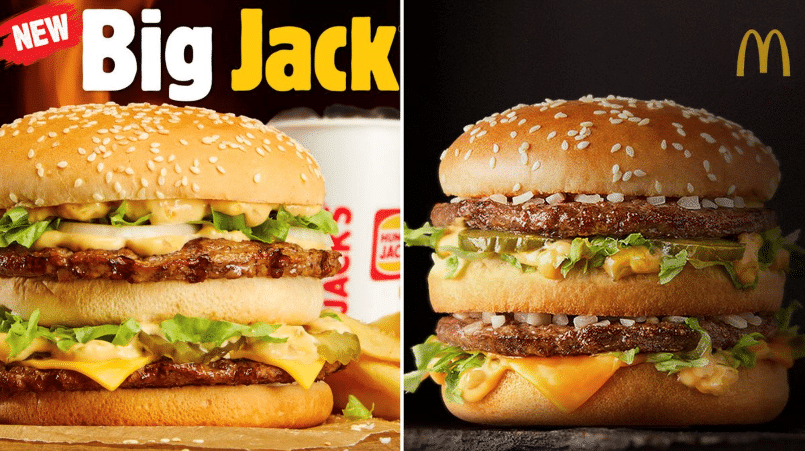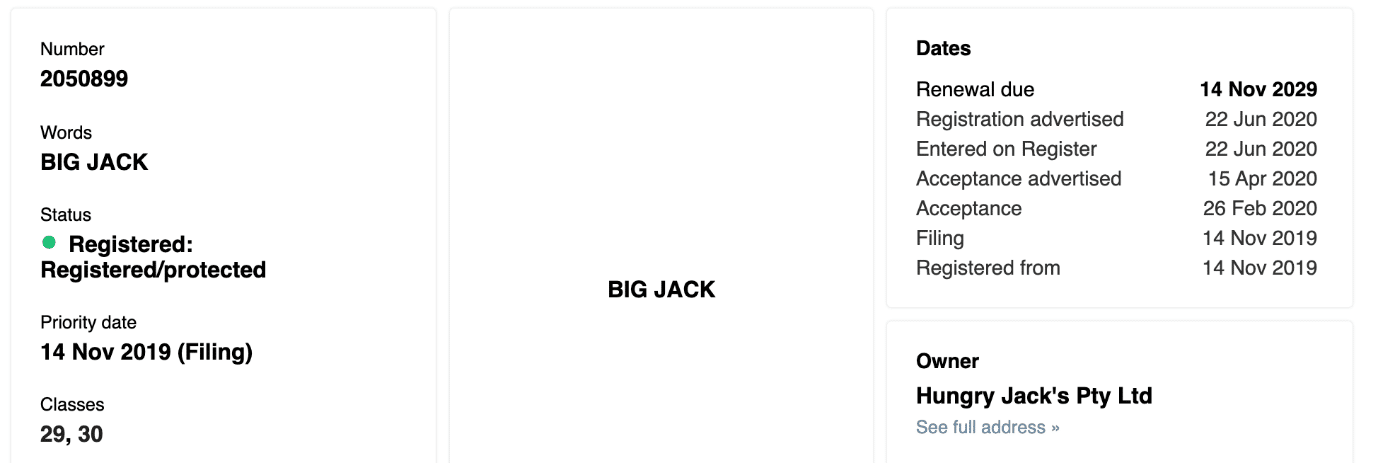McDonald’s and Hungry Jack’s Beef Leads to Trade Mark Bun Fight

Courtesy of Hungry Jack’s / McDonald’s
Look familiar?
In June 2020, Hungry Jack’s launched its new burger range featuring the “Big Jack” and “Mega Jack” burgers.
People were quick to point out that not only did the burgers themselves look similar to the McDonald’s Big Mac, but the name “Big Jack” seemingly referenced the iconic burger.
A missed opportunity to oppose Hungry Jack’s trade mark registration has forced McDonald’s to rely on litigation to stop the use of the trade marks.
big jack’s attack on mac
In a carefully considered approach, before officially launching the burgers, Hungry Jack’s successfully registered the “Big Jack” trade mark and is currently seeking registration for “Mega Jack” in Australia.
The Big Jack Mark was entered on the Register only six days before Hungry Jack’s began advertising its new burgers. McDonald’s did not oppose the Big Jack Mark during the relevant opposition period, being within two months of the mark being advertised.
fast feud in federal court
After missing its opportunity to oppose registration of the Big Jack Mark, McDonald’s only option has been to take court action.
On 28 August 2020, McDonald’s filed its suit with the Federal Court alleging that Hungry Jack’s use of the Big Jack trade mark is substantially identical with or deceptively similar to its own Big Mac trade mark.
McDonald’s argues the Big Jack trade mark is liable to be cancelled on various grounds, including that it is likely to deceive or cause confusion among consumers. It also accuses Hungry Jack’s of filing its application in bad faith.
A key submission that McDonald’s will seek to rely on is its reputation in Australia. In its lawsuit, McDonald’s states that since 1973 it has acquired a substantial and valuable reputation in Australia for selling Big Macs. Consequently, it believes that a substantial number of consumers would be deceived into thinking the Big Mac and Big Jack are connected.
Seeking to rely on its reputation in this manner could backfire on McDonald’s. Its reputation in the Big Mac is so well-established that it may be found that consumers would never have cause to wonder whether a Hungry Jack’s burger is actually a Big Mac. Indeed, it would be reasonable for most customers to presume they can only purchase a Big Mac from a McDonald’s store. Further, Hungry Jack’s will likely argue that it is relying on its own reputation in the word “Jack” to market its burgers.
In furthering its arguments that consumers may be deceived, McDonald’s has highlighted that Hungry Jack’s has deliberately adopted or imitated the distinctive look of the Big Mac, along with its ingredients and famous tagline: two all-beef patties, special sauce, lettuce, cheese, pickles, onions – on a sesame seed bun.
McDonald’s is seeking cancellation of the Big Jack Mark, together with a declaration that Hungry Jack’s infringed its Big Mac and related Mega Mac trade marks. McDonald’s is also seeking damages, interest and costs, as well as an order that all promotional materials using the Hungry Jack’s trade marks be destroyed.
This is not the first time McDonald’s has missed the mark on protecting its Big Mac trade mark. Last year, its European registration for “Big Mac” was revoked for non-use after it failed to prevent an Irish fast food chain from using the trade mark “Supermac’s”. Removal of the McDonald’s registration allowed other companies in the European Union to use “Big Mac” and resulted in Burger King Sweden grilling Big Mac in its advertising.
jack’s position in legal pickle
Some might wonder how Hungry Jack’s was capable of registering the Big Jack Mark in the first place. Of particular consideration for the trade marks examiner is whether the Big Jack Mark is distinctive.
The distinctive element of the McDonald’s “Big Mac” trade mark is the word “Mac”. The word “big” is descriptive in both marks. Although “Mac” and “Jack” are aurally similar, they might not cause consumer confusion.
Hungry Jack’s has struck back at the allegations, stating that consumers would not confuse the marks or the burgers, which have many differences. According to Hungry Jack’s, these differences extend to the size, taste, presentation and packaging of the respective burgers.
In a new television advert to flame the beef, Hungry Jack’s directly addressed the lawsuit with the ad’s voiceover saying:
“Someone’s suing Hungry Jack’s. They reckon Aussies are confusing the Big Jack with some American burger. But the Big Jack’s clearly bigger with 25% more Aussie beef, flame-grilled with a barbecue taste. You can only get the Big Jack at Hungry Jack’s.”
A spokesperson for Hungry Jack’s followed up the ad by explaining that Australians know Hungry Jack’s does not sell smaller pan-fried American burgers. In seeking to distinguish its reputation in this way, Hungry Jack’s will likely rely on similar arguments in its defence.
key fast food takeaways
The successful registration of the Big Jack Mark demonstrates that it is imperative for businesses to actively protect their trade marks and monitor the Register for any marks filed by competitors.
Opposing the Big Jack Mark would have prevented McDonald’s from heading into a whopper legal bunfight and saved a significant amount of time and money.
The Intellectual Property Team at Macpherson Kelley is skilled at assisting businesses in protecting their trade mark portfolios, including monitoring the Register, filing and defending trade mark oppositions, and trade mark infringement. If your business requires support in its brand strategy, please contact our Intellectual Property Team.
The information contained in this article is general in nature and cannot be relied on as legal advice nor does it create an engagement. Please contact one of our lawyers listed above for advice about your specific situation.
more
insights
ASIC redacts officeholder data: What your business needs to know
Implied contract terms: Court of Appeal confirms no implied right for hospital to terminate long term emergency services agreement
Bunnings faces off against the Privacy Commissioner over facial recognition technology
stay up to date with our news & insights
McDonald’s and Hungry Jack’s Beef Leads to Trade Mark Bun Fight

Courtesy of Hungry Jack’s / McDonald’s
Look familiar?
In June 2020, Hungry Jack’s launched its new burger range featuring the “Big Jack” and “Mega Jack” burgers.
People were quick to point out that not only did the burgers themselves look similar to the McDonald’s Big Mac, but the name “Big Jack” seemingly referenced the iconic burger.
A missed opportunity to oppose Hungry Jack’s trade mark registration has forced McDonald’s to rely on litigation to stop the use of the trade marks.
big jack’s attack on mac
In a carefully considered approach, before officially launching the burgers, Hungry Jack’s successfully registered the “Big Jack” trade mark and is currently seeking registration for “Mega Jack” in Australia.
The Big Jack Mark was entered on the Register only six days before Hungry Jack’s began advertising its new burgers. McDonald’s did not oppose the Big Jack Mark during the relevant opposition period, being within two months of the mark being advertised.
fast feud in federal court
After missing its opportunity to oppose registration of the Big Jack Mark, McDonald’s only option has been to take court action.
On 28 August 2020, McDonald’s filed its suit with the Federal Court alleging that Hungry Jack’s use of the Big Jack trade mark is substantially identical with or deceptively similar to its own Big Mac trade mark.
McDonald’s argues the Big Jack trade mark is liable to be cancelled on various grounds, including that it is likely to deceive or cause confusion among consumers. It also accuses Hungry Jack’s of filing its application in bad faith.
A key submission that McDonald’s will seek to rely on is its reputation in Australia. In its lawsuit, McDonald’s states that since 1973 it has acquired a substantial and valuable reputation in Australia for selling Big Macs. Consequently, it believes that a substantial number of consumers would be deceived into thinking the Big Mac and Big Jack are connected.
Seeking to rely on its reputation in this manner could backfire on McDonald’s. Its reputation in the Big Mac is so well-established that it may be found that consumers would never have cause to wonder whether a Hungry Jack’s burger is actually a Big Mac. Indeed, it would be reasonable for most customers to presume they can only purchase a Big Mac from a McDonald’s store. Further, Hungry Jack’s will likely argue that it is relying on its own reputation in the word “Jack” to market its burgers.
In furthering its arguments that consumers may be deceived, McDonald’s has highlighted that Hungry Jack’s has deliberately adopted or imitated the distinctive look of the Big Mac, along with its ingredients and famous tagline: two all-beef patties, special sauce, lettuce, cheese, pickles, onions – on a sesame seed bun.
McDonald’s is seeking cancellation of the Big Jack Mark, together with a declaration that Hungry Jack’s infringed its Big Mac and related Mega Mac trade marks. McDonald’s is also seeking damages, interest and costs, as well as an order that all promotional materials using the Hungry Jack’s trade marks be destroyed.
This is not the first time McDonald’s has missed the mark on protecting its Big Mac trade mark. Last year, its European registration for “Big Mac” was revoked for non-use after it failed to prevent an Irish fast food chain from using the trade mark “Supermac’s”. Removal of the McDonald’s registration allowed other companies in the European Union to use “Big Mac” and resulted in Burger King Sweden grilling Big Mac in its advertising.
jack’s position in legal pickle
Some might wonder how Hungry Jack’s was capable of registering the Big Jack Mark in the first place. Of particular consideration for the trade marks examiner is whether the Big Jack Mark is distinctive.
The distinctive element of the McDonald’s “Big Mac” trade mark is the word “Mac”. The word “big” is descriptive in both marks. Although “Mac” and “Jack” are aurally similar, they might not cause consumer confusion.
Hungry Jack’s has struck back at the allegations, stating that consumers would not confuse the marks or the burgers, which have many differences. According to Hungry Jack’s, these differences extend to the size, taste, presentation and packaging of the respective burgers.
In a new television advert to flame the beef, Hungry Jack’s directly addressed the lawsuit with the ad’s voiceover saying:
“Someone’s suing Hungry Jack’s. They reckon Aussies are confusing the Big Jack with some American burger. But the Big Jack’s clearly bigger with 25% more Aussie beef, flame-grilled with a barbecue taste. You can only get the Big Jack at Hungry Jack’s.”
A spokesperson for Hungry Jack’s followed up the ad by explaining that Australians know Hungry Jack’s does not sell smaller pan-fried American burgers. In seeking to distinguish its reputation in this way, Hungry Jack’s will likely rely on similar arguments in its defence.
key fast food takeaways
The successful registration of the Big Jack Mark demonstrates that it is imperative for businesses to actively protect their trade marks and monitor the Register for any marks filed by competitors.
Opposing the Big Jack Mark would have prevented McDonald’s from heading into a whopper legal bunfight and saved a significant amount of time and money.
The Intellectual Property Team at Macpherson Kelley is skilled at assisting businesses in protecting their trade mark portfolios, including monitoring the Register, filing and defending trade mark oppositions, and trade mark infringement. If your business requires support in its brand strategy, please contact our Intellectual Property Team.








